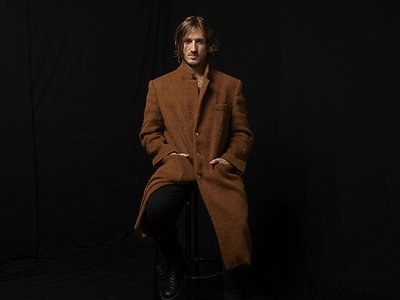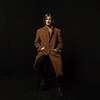Part 1
Name: Emanuel Satie
Nationality: German
Occupation: Producer, DJ
Current Release: Pete Tong & Emanuel Satie's 'Time For Love' is out now on Saved.
Recommendations: Steven Pressfield - The War of Art: it’s not art, but it talks about art and it’s extremely useful for creatives. It’s my personal bible and helped me a lot with my creative process.
The Favourite - is the last movie I’ve seen that completely blew me away. The performance of Olivia Colman as the Queen is incredible.
If you enjoyed this interview with Emanuel Satie, visit his facebook page or soundcloud profile for a whole lot more.
When did you start writing/producing music - and what or who were your early passions and influences? What what is about music and/or sound that drew you to it?
I started playing around with music when I was 10-11 years old. I was forming bands with my class mates and I can remember that I was always the one directing the whole thing, writing the lyrics for everyone and organising the roles everyone played in the band. It was pretty silly, but we actually organised some school gigs and got a lot of love from our class mates haha. Besides I was also always playing the cello in the school orchestra and from that I moved on to do battle and gangster rap. I remember that it was extremely explicit, I wanted to be as radio unfriendly as possible and I was only 13 years old, it’s hilarious looking back at it now.
Only when I was able to go to clubs I discovered house music and techno and then after some time got into production and DJing, I must have been 21.
Why I was so drawn to music I’m not sure, but I would guess it’s because my parents were both musical. My father was a hobby pianist and my mum was a semi professional ballet dancer. My father playing the piano and my mum dancing in the living room is one of my childhood’s sweetest memories.
There was also a great record collection in the house with a lot of soul, funk, rock, disco and classical music and I loved to just listen to as much of it as I could. Short, there was always music around growing up, that’s where I must have got it from.
For most artists, originality is first preceded by a phase of learning and, often, emulating others. What was this like for you? How would you describe your own development as an artist and the transition towards your own voice? What is the relationship between copying, learning and your own creativity?
In my opinion copying is the most important part when you are starting to do anything in life. In the beginning it’s about understanding how things work, learning the basics and not necessarily about expressing your own unique voice. It’s like the baby that is copying the same sounds that its parents are making with their mouths. Eventually the baby understands how language works and can express itself freely. In art it’s the same process.
I can only encourage people starting out to produce to just copy and recreate what your favourite producers do, it’s just important that eventually you grow out of that and express yourself in a unique way, otherwise you are always gonna be one step behind and people can just feel that something’s off about your music.
What were your main compositional- and production-challenges in the beginning and how have they changed over time?
For a very long time my main focus was just on making something that sounds good in a club, getting the frequencies right etc, the kicks - bass combination was always especially challenging. When I figured that out it was all about learning how to create the energy and arrangement necessary to make a track that works in a club. Nowadays I’m working on my compositional skills, I know how to make a club banger, now it’s about making music that connects more deeply and more universally.
What was your first studio like? How and for what reasons has your set- up evolved over the years and what are currently some of the most important pieces of gear for you?
I started producing on a laptop from a discounter supermarket only working with headphones and a cracked Ableton. The laptop would heat up so much that I had to reboot every 20 minutes or so. It was awful. I bought a macbook soon but kept working completely in the box for a very long time and only started collecting gear the past couple years. At the moment I like the classics like JUNO60, 303, SH-2 but also newer pieces like the AS-1 from Pioneer and Rob Papen.
[Read our feature on the Roland TB-303]
How do you make use of technology? In terms of the feedback mechanism between technology and creativity, what do humans excel at, what do machines excel at?
At the moment creativity and complex thinking is still the human being’s job, this is our strength. Technology’s job is to help us do that and make life easier for us. AI might change that, but as of right now I view technology simply as a tool. I’m not obsessed with it per se, I’m not interested in how it works, I just use it to get the results that I want. I believe that technology is our way forward, it has always been. For example, I don’t think we’re gonna solve the environmental crisis by everyone reducing their carbon footprint, that’s on many levels not realistic, technology is the way to go here I believe.
Production tools, from instruments to complex software environments, contribute to the compositional process. How does this manifest itself in your work? Can you describe the co-authorship between yourself and your tools?
That’s what I love so much about electronic music. On a traditional instrument, say a piano, the sound palette is pretty much given, but with electronic music you have this dynamic between you and the machine, it’s like jamming together with another person almost. Even if you know a machine well, it can surprise you in many ways and you’re like „wow this sound you’re making right now is great, let’s explore this more“. I like this element of luck a lot.
Collaborations can take on many forms. What role do they play in your approach and what are your preferred ways of engaging with other creatives through, for example, file sharing, jamming or just talking about ideas?
I’m collaborating a lot lately. Only in the last year I had music released with traditional musicians from Ethiopia, vocalists (Nanghiti & MAMA), percussionists (Solo Sanou), other producers (Ninetoes, Mowgan) and last but not least the band of Billy Cobham. I’m continuing this way of working this year, working with singers, pianists and I just released a collabo with Pete Tong.
I think collaboration is extremely important. We have this notion in electronic music that everything has to be done by one person, if you look at similar genres of music like hip hop, that’s not the case, they only care about the end product and find the best person for each task. Kanye West for example has huge lists of production credits on his album. He’s gonna come up with an idea, play the drums, play a melody, use a sample and then ask someone better at each task to do it better. So it’s not about him doing everything just to be able to say „I did this completely on my own“, it’s all about making the best music possible, coming up with a master piece. I like this way of thinking and I’m moving towards it more and more.






